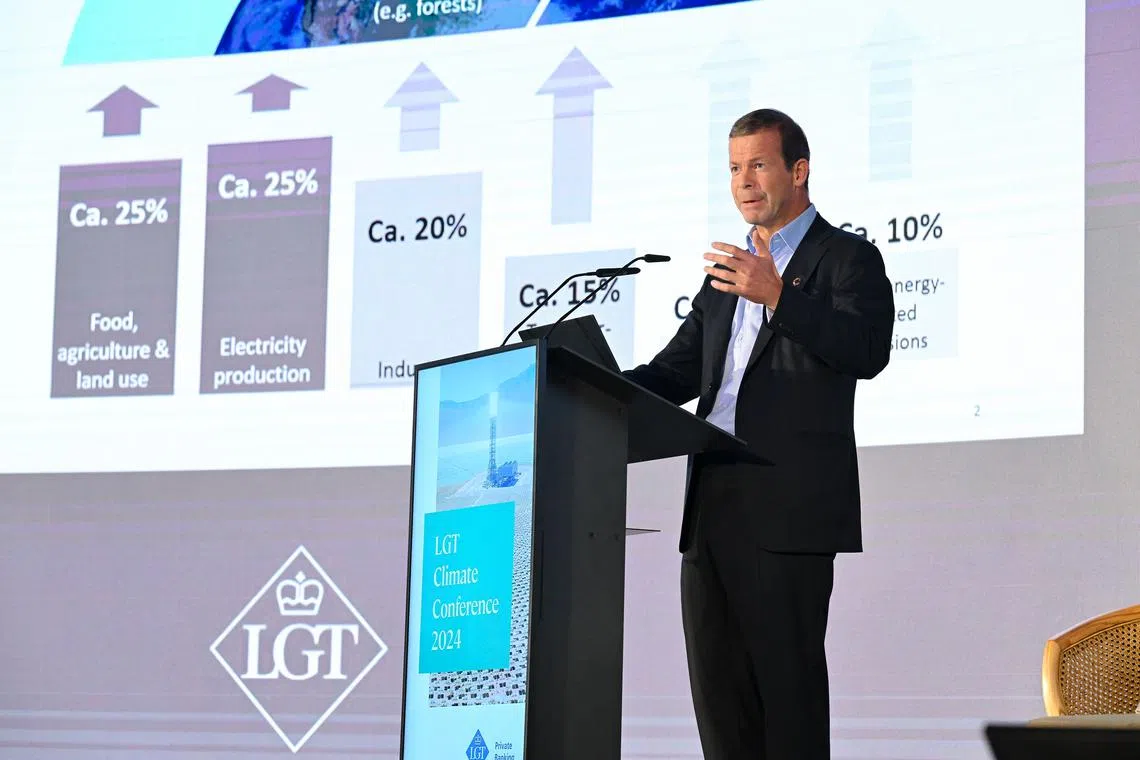Portfolio decarbonisation: How investors can drive global net-zero targets
By directing capital towards sustainability goals, private banking and asset management group LGT shows how meaningful impact can go hand in hand with long-term returns
The journey to net-zero emissions is unfolding before us, shaped by the efforts of many. Investors, in particular, play a pivotal role in driving impact during this transition to a low-carbon future.
Says His Serene Highness Prince Max von und zu Liechtenstein, chairman of Liechtenstein-based private banking and asset management group LGT: “Investors can create meaningful impact by directing capital to the areas that support the kind of progress our planet needs.
“There are many sectors, from transport and energy to construction, that offer attractive investments, both from a sustainability and a returns standpoint. These investments can make a real difference.”
By focusing on clean energy investments, investors are not only systematically decarbonising their portfolio, but also tapping opportunities in sustainable sectors.

Take for example Tesla. The company disrupted the traditional automobile sector and has now evolved into one of the global leaders in electric mobility. “Further innovative, sustainable technologies – some of them very promising – are also emerging in other emissions-intensive sectors,” says Prince Max.
For LGT, which is owned by the Princely House of Liechtenstein, thinking, managing and investing sustainably are integral parts of its DNA. LGT has increasingly embedded sustainability in its investments and processes over the past 15 years. It is part of the group’s efforts to align with climate goals and proactively reduce the carbon footprint of its investment holdings while generating sustainable financial returns.
Navigate Asia in
a new global order
Get the insights delivered to your inbox.
Says Prince Max: “At LGT, our goal is to find the best and most promising companies, and leverage them to generate sustainable financial returns and accelerate the transition to a low-carbon economy.”
Measuring sustainability impact
But in recent years, sustainable investing has come under fire for lacking transparency and standardised metrics. Such criticisms are not without reason, says Prince Max.
“Granted, the transparency is not perfect and more standardisation of impact measures would be desirable. But the search for too much perfection is often the enemy of progress, and we have enough knowledge to assess the environmental and social footprint of companies well and to sensibly integrate this information into our investment and management decisions. While some of the criticism is constructive and helpful, too much of it is used as a bad excuse for sticking to the old modus operandi that is no longer justifiable in the context of our challenges,” he says.
Sustainability metrics – despite their current limitations – can still effectively steer investments towards meaningful environmental and social outcomes, he adds.
Lightrock, a global investment platform that collaborates with LGT Group, advises funds that invest in private companies across three key impact themes: People, Planet and Productivity. Its climate strategy prioritises companies that measurably reduce greenhouse gas emissions. Investment decisions require dual approval of both financial and impact factors, assessed against strict criteria.
Says Lightrock chief executive officer and managing partner Pal Erik Sjatil: “Our impact specialists determine optimal metrics for measuring climate impact. With a portfolio spanning climate mitigation and adaptation, we combine market expertise with our proprietary methodology for robust assessments.”
And investors are increasingly embracing the idea that purpose and profits are not mutually exclusive, but they are aligned. In fact, they recognise that companies with robust sustainability practices are often better positioned to manage risks, capitalise on opportunities and deliver value.
A research paper published by American finance company MSCI in March 2024 shows that companies with higher environmental, social and governance (ESG) ratings outperformed their lower-rated counterparts over the periods of study, mainly due to better earnings fundamentals and higher dividend yields.
Says Olivier de Perregaux, chief executive officer of LGT Private Banking: “Decarbonisation requires a long-term view. Many clients, while initially sceptical, are becoming more receptive to the idea that sustainable investments can achieve attractive returns and contribute to a better long-term economic development.”
Aligning climate goals with investing

Central to LGT’s decarbonisation effort is the Princely Strategy, a diversified investment approach aimed at delivering attractive returns to investors with reduced volatility.
The Strategy seeks to systematically reduce the overall emissions of its underlying investment holdings.
As a result of consistent efforts across all asset classes, its emissions intensity has been reduced from 48.5 tonnes of CO2 per million US dollars in the first quarter of 2021, to 30.4 tonnes CO2 per million US dollars invested in the second quarter of 2024.
It also hopes to accelerate its climate contribution through the introduction of a new share class, which includes a mechanism for the purchase and retirement of carbon credits in both the voluntary and mandatory markets. This allows investors to address residual greenhouse gas emissions.
Joining fight against climate change
The world remains far from meeting its climate objectives. To keep global warming to no more than 1.5 deg C – as called for in the Paris Agreement – emissions must be reduced by 45 per cent by 2030 and reach net zero by 2050. This transition will require investment to more than triple to around US$4 trillion (S$5.3 trillion) annually, according to the International Energy Agency.
As a regular participant in climate dialogues around the world, LGT sees two equally crucial strategies to winning the fight against climate change: lowering emissions and keeping carbon out of the atmosphere by protecting our natural carbon sinks, and advancing scalable carbon removal technologies.
However, the market’s failure to price emissions and ecosystem benefits accurately have in a way set up barriers to climate action, leading to widespread inaction by businesses and individuals, observes Prince Max. While many governments have not been able to correct this promptly and sufficiently, Singapore has been an exception, he says.
As a low-lying island nation, Singapore faces existential risks from climate change. The Singapore Green Plan 2030 outlines its path to net-zero emissions by 2050 (2045 for the public sector).
Key initiatives under the plan include significant investments in climate adaptation measures such as the construction of seawalls to protect Singapore’s coastline, advancing research and development in green tech and planting one million more trees by 2030.
This is an example of how public policies can be more supportive, creating a foundation for broader and faster decarbonisation.
Championing action and transparency

As part of its aim to achieve net-zero emissions from its own investments and operations by 2030, LGT has committed to maintaining transparency on its carbon footprint across all operational activities.
For its flagship LGT Climate Conference 2024 held in Singapore on Oct 17, the firm purchased high-quality carbon certificates to address the 116 tonnes of carbon dioxide from activities including travel, accommodation, catering, energy and waste.
The firm is active in the emissions trading systems in the European Union and the United Kingdom, and has since 2010 started purchasing carbon credits on the voluntary carbon market in amounts equal to the carbon emissions from its operations.
In addition, LGT empowers clients to make informed sustainable investment decisions. The LGT ESG Navigator, a proprietary analysis tool, provides a comprehensive quantitative overview of the environmental, social and governance (ESG) quality of clients’ investment portfolios and alignment with the sustainable development goals.
Says Olivier de Perregaux, chief executive officer of LGT Private Banking: “Decarbonisation is the most urgent but also the most tangible lever we can pull… While clients ultimately decide how to approach decarbonisation, LGT provides tools that enable those interested in aligning their investments with climate goals to do so.”
Prince Max says he remains optimistic about global sustainability progress. More and more businesses are recognising the scale of the climate challenge and have turned their commitments into action.
Many technologies and solutions for decarbonisation and ecosystem restoration already exist and now require scaling – a challenge that investors are increasingly stepping up to meet.
Says Prince Max: “Like most transformations, the process is not linear. Unfortunately, the fundamental driver of this change is the increasing damage caused by climate change. So the question is not whether change will happen, but when and how fast.”
Learn how LGT can help you decarbonise your portfolio here.
Disclaimer:
This advertorial is intended only for your information purposes. It does not constitute investment advice, nor is it intended as an offer, solicitation of an offer, or public advertisement or recommendation to buy or sell any investment or other specific product, or enter into any financial transaction. This advertorial has not been reviewed by the Monetary Authority of Singapore. You should contact a representative from LGT Bank (Singapore) Ltd in respect of any matters arising from, or in connection with, this advertorial.

Share with us your feedback on BT's products and services
